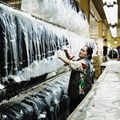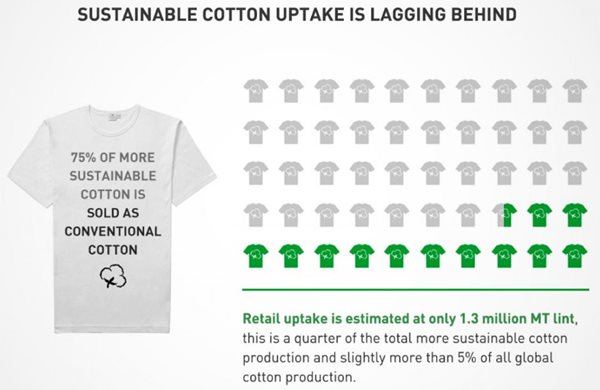Others in the top 10 were C&A (4), Otto Group (5), Marks and Spencer Group (6), Levi Strauss & Co. (7), Tchibo GmbH (8), Nike (9) and Decathlon Group (10).
The Cotton Ranking 2020 is published by three NGOs – Pesticide Action Network (PAN) UK, Solidaridad and WWF – based on research conducted and compiled by independent consultancy Aidenvironment. Seventy-seven cotton-using companies estimated to use more than 10,000 metric tonnes of cotton annually are assessed on their public policies and commitments, how much of the cotton they use is actually from sustainable sources, and on how open they are with their supply chain traceability.
Overall the Cotton Ranking 2020 reveals significant progress by big brands toward more sustainable cotton, but also that the divide is growing between companies that take their responsibilities seriously and the many laggard companies that do not.
75% of sustainable cotton sold as conventional cotton
While 21% of global cotton production is now more sustainable, only 5% of global production is actively bought as sustainable by retailers and brands. The rest has to be sold as conventional cotton because not enough of the big brands explicitly shop for more sustainable cotton.
“Shockingly, three quarters of sustainable cotton is still sold as conventional cotton. Farmer groups end up selling the majority of their more sustainable produce as conventional cotton due to lack of demand. If the failing brands took their responsibilities seriously, this wouldn’t be an issue," explains Isabelle Roger, global cotton programme manager at Solidaridad Network.
Big brands embracing sustainable cotton
Progress in sustainable cotton use has been exemplified by companies like Bestseller (Jack&Jones, Vera Moda, Only) and Decathlon, which in 2017 were ranked as ‘starting the journey’ but are now ‘leading the way’ thanks to the sharp increase in their uptake of sustainable cotton. Almost all companies who made public commitments have made substantial improvements, including well-established trailblazer IKEA, and the new front-runner Adidas.
The number of companies lagging behind is largely unchanged since 2017. Around one-third of companies, including global names like Amazon, Footlocker, Giorgio Armani and Forever 21 all scored zero in the ranking, despite increasing global concerns about worsening water scarcity, pollution, land degradation, and loss of biodiversity.
Alexis Morgan, WWF Global Water Stewardship Lead, says, “The ranking reveals that there is a small but growing group of frontrunners who are leading the way toward a more sustainable cotton sector, with their commitment over the last few years paying off. The report gives plenty of evidence that public commitments lead to results, however, many companies have still not taken the necessary steps. CEOs of these laggard companies must change course and make time-bound commitments to use more sustainable cotton.”
Anika Kozlowski 8 Aug 2019
Majority now have public commitments
The report also reveals that for the first time more than half of ranked companies now have commitments to use sustainable cotton, but the three NGOs express concern that overall companies are not achieving as much as they should.
Eleven big brands, including Nike, H&M and C&A group, have committed to sourcing 100% of their cotton from more sustainable sources by the end of this year. This includes Ikea, Adidas and Marks and Spencer who are aiming to maintain their 100% sustainable sourcing track records. The report publishers encourage them all to not only meet and sustain their target over time, but also to uphold their commitment to making the global cotton sector more sustainable, and have a deeper positive impact on cotton farming communities and their environment.
Time-bound commitments and transparency needed
Brands that are ‘leading the way’ perform better than the rest in all areas but the difference is most marked in how much of the cotton they source is from more sustainable sources. Only 23 companies report on the absolute volume of more sustainable cotton they source, and most have shared this in confidence with the researchers. Only 11 companies publish how much cotton lint they source in total.
Keith Tyrell, director of PAN UK adds, “Companies are not transparent enough about their supply chains and purchasing practices. We need to see more time-bound targets, higher proportions of more sustainable cotton being sourced, and transparency on where their cotton really comes from.”
View the full Sustainable Cotton Ranking 2020 here.




























